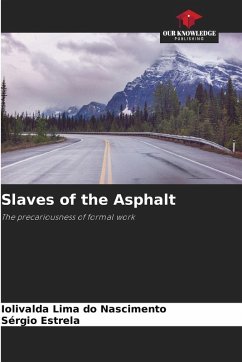"Slaves of the Asphalt" is a work that portrays the working conditions of drivers of dangerous cargo, especially fuel, who load at cargo supply terminals in the port city of Cabedelo, in the state of Paraíba. The title corresponds to a self-designation, that is, the drivers define themselves this way because of the terrible working conditions to which they are subjected, as well as the long working hours necessary for their reproduction. In times of flexibilization in the world of work, in a context in which Brazilian federal government agencies are recording an increase in hiring rates in the service sector, a global trend driven by the productive restructuring of capital, it is clear that although these jobs are legal, they show strong signs of precariousness. The author presents the results of a study on formal employment and reveals surprising forms of precariousness, ranging from exhausting working hours to the suppression of workers' rights.
Bitte wählen Sie Ihr Anliegen aus.
Rechnungen
Retourenschein anfordern
Bestellstatus
Storno








